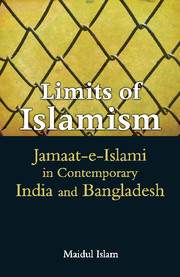Book contents
- Frontmatter
- Dedication
- Contents
- List of Tables
- Acknowledgements
- Introduction: Islamism(s) of Academics and Islamists
- Chapter 1 Islamism and Ideology: Philosophical Issues and Analytical Categories
- Chapter 2 Islamism in Neoliberal India
- Chapter 3 Ideological Articulations of Jamaat-e-Islami Hind
- Chapter 4 Islamism in a Muslim Majority Context: The Case of Bangladesh
- Chapter 5 The Crisis of Islamist Populism of Bangladesh Jamaat-e-Islami
- Chapter 6 Islamism in Contemporary India and Bangladesh: Comparative Overview of the Politics of Alternative
- Appendix
- Bibliography
- Index
- About the Author
Chapter 6 - Islamism in Contemporary India and Bangladesh: Comparative Overview of the Politics of Alternative
Published online by Cambridge University Press: 05 April 2015
- Frontmatter
- Dedication
- Contents
- List of Tables
- Acknowledgements
- Introduction: Islamism(s) of Academics and Islamists
- Chapter 1 Islamism and Ideology: Philosophical Issues and Analytical Categories
- Chapter 2 Islamism in Neoliberal India
- Chapter 3 Ideological Articulations of Jamaat-e-Islami Hind
- Chapter 4 Islamism in a Muslim Majority Context: The Case of Bangladesh
- Chapter 5 The Crisis of Islamist Populism of Bangladesh Jamaat-e-Islami
- Chapter 6 Islamism in Contemporary India and Bangladesh: Comparative Overview of the Politics of Alternative
- Appendix
- Bibliography
- Index
- About the Author
Summary
In the previous four chapters, I have made an overview of the politico-ideological articulations of the Islamist party, the Jamaat-e-Islami, in two different contexts of contemporary India and Bangladesh. In this chapter, I intend to make a comparative analysis on the basis of the narrative in the previous chapters. In Bangladesh, the politico-ideological articulations of Jamaat are both linked to the historical and contemporary experiences of the Bangladesh Jamaat. In India, in contrast, nobody in the political realm was concerned about what Jamaat-e- Islami actually said or did in the past. This is surely related to the dominance of Hindutva majoritarianism than Muslim sectarianism in India. Since JIH is a much smaller organization when compared to Hindutva organizations in India, Islamism in a minority context of India has a much lesser presence in the contemporary political and historical discourses of India than Hindutva. However, even in contemporary Bangladesh, the role of Jamaat before the creation of Bangladesh or during the Bangladesh Liberation war is often put into scrutiny. Not ignoring such specific historical contexts, nonetheless, this book is written from the vantage point of contemporary India and Bangladesh, where neoliberalism is the ruling philosophy in governmental affairs of both the countries. In the previous four chapters, I have demonstrated how the Jamaat has responded to neoliberalism in two different contexts of India and Bangladesh. Let me now comparatively analyze the similarities and differences of Jamaat's responses to neoliberalism in India and Bangladesh and account for possible reasons behind such responses.
Islamism encounters neoliberalism: Contrasting Indo-Bangladesh experiences
The fundamental differences between contemporary Islamism and Hindutva brand of communal–fascism in South Asia is that Islamism has an anti-imperialist and anti-consumerist character, whereas Hindutva genuflects at imperialism with a pro-neoliberal, pro-imperialist, pro-consumerist and elitist tendency as observed by Patnaik. I further add that Islamists in India have a subaltern character and is responding to threats of economic and cultural globalization.
- Type
- Chapter
- Information
- Limits of IslamismJamaat-e-Islami in Contemporary India and Bangladesh, pp. 235 - 276Publisher: Cambridge University PressPrint publication year: 2015



